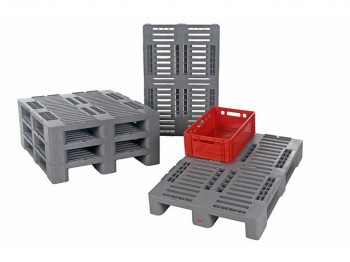Are plastic pallets the future?
03 Feb 2014
Most everyday articles such as food, apparel or medicine arrive at their retail point on board a pallet. This is the standard method for shifting goods. The material from which the humble pallet is made has a major impact on any company’s costs.
Anyone running a haulage business, warehouse or retail outlet that uses pallets for shifting goods and storage knows about rising costs. Pallets can be difficult to shift, break apart at the most inconvenient moments, cause injury to staff trying to move a heavy load of wooden pallets and are expensive to replace. This is why the future lies in plastic pallets.
Flexible and Lightweight
Plastic is a very flexible material. It can be moulded to match the shape of the goods it transports. This minimises damage to the goods as well as ensuring the high hygiene standards that are needed in the food and pharmaceutical industries.
Although it has a large load-carrying capacity, a plastic pallet is lightweight compared with wood or any other material. Its strength is based on how the plastic is reinforced. A super-strength plastic pallet can be manufactured to any customer’s specifications.
A plastic pallet nest loaded on a lorry can weigh 500 kg less than the equivalent number of wooden pallets. Wooden pallets do not nest as each one stacks above the preceding pallet, creating a heavy pile. The lower weight of a plastic nest of pallets reduces transport and other logistics costs for the customer. It also eliminates all of the back-breaking workplace accidents that occur when staff have to shift pile of wooden pallets.
Durability
- A plastic pallet is longer lasting. A wooden pallet usually lasts two long trips carrying goods. A plastic pallet will last 100 trips.
- Wood used in pallets has to be chemically treated to avoid fungus growth and infestation by insects. A plastic pallet does not need any of these procedures and can just be wiped clean and reused. This is a particular advantage during those periods of heightened public concern about spreading viruses such as bird flu or other infections. The plastic pallet can be disinfected easily, while the wooden pallet will need to be chemically treated again or replaced.
- The plastic pallet can also be left outside in the elements without any concern that it will disintegrate in a rainstorm. Even an engineered wooden pallet cannot sustain such a degree of weather damage.
- Once their useful life is over, wooden pallets have to be disposed of or burned. Occasionally they can be recycled into small side tables if the wood is still of a reasonable quality. But a plastic pallet is almost infinitely recyclable. Not only can it be reused continuously, but it can also be returned to the manufacturer for recycling. Manufacturers offer plastic pallets for sale in both virgin and recycled plastic.

